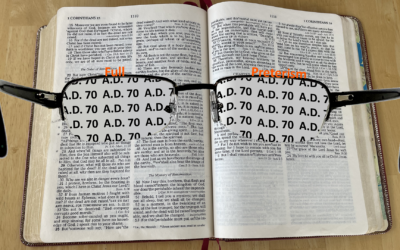ARTICLE ARCHIVES

What Is a Christian Cult? Part 2
In part one of this series on cults, we discussed how a Christian cult is any religious movement that claims to follow the Bible but distorts one or more of the essential doctrines of Christianity. We considered the heretical views of early movements in Christianity that had distorted the nature of God and the divinity of Jesus Christ. We also drew parallels to cults today, particularly Jehovah’s Witnesses and Mormons, who deny the full deity of Christ and the doctrine of the Trinity.
What Is a Christian Cult? Part 1
A Christian cult, or theological cult, is any religious movement that claims to belong to Christianity but distorts one or more of the essential doctrines of Christianity taught in the Bible. Since the time of Christ, heretical groups such as these have attacked various aspects of the nature of God and the soteriology of Christ.
The Theology of Job
Many people have heard of the patience of Job. He was a righteous man who endured great hardship and yet maintained his faith in God. But what is often overlooked is the rich theology contained in the book of Job. Does Job’s theology match that of the modern Christian?
Full Preterism is Full of Error
Christianity promotes a full-orbed world-and-life view that flows out of the Scriptures of the Old and New Testaments. For a worldview to be a complete, holistic worldview it must deal with both the world’s beginning at creation as well as its ending at the consummation — and all that lies in between. Thus, it should show where history came from and where it will end.
The Essentials – Part 2
In part 1, we looked at those doctrines that are essential to salvation: those that cannot be denied by a person whom Christ has saved…. But how do we know that our faith in God is genuine? After all, Jesus refers to people who were confident in their salvation, who professed Christ as Lord, and even performed miracles in His name; yet, they will not enter heaven. Just imagine living your life, thinking you are a Christian, being confident in your faith in Christ, and then having Him say to you on Judgment Day, “I never knew you. Depart from Me.”
The Essentials – Part 1
What doctrines are absolutely essential to Christianity? As the Word of God, all Scripture is equally and absolutely authoritative. But not all Scripture is equally clear, nor equally central to salvation. Christians disagree on certain nuanced details, yet are united by our common salvation by God’s grace through faith in Christ. On the other hand, there are people who profess to be Christians, but who deny central, core doctrines of the faith. Where is the line that divides genuine faith from a false faith? At what point does theological error become heresy?
Denying the Holy Spirit… Again.
One of the most fundamental Christian doctrines is that of the Trinity. It separates genuine Christianity from the cults and from other religions and is essential to understanding the Gospel. We recently received a message challenging an article I had written responding to a critic who denies the third Person of the Trinity: The Holy Spirit.
Has the Word “Eternal” Been Correctly Translated?
We have been examining the claims of critics who deny the biblical teaching of eternal hell. Often, those who deny central Christian doctrines will deny that the major English versions of Scripture are well-translated. They must argue this way because all the conservative English translations show that the duration of punishment and torment in hell for unbelievers is the same as the duration of heaven for believers – namely eternal. So, in this segment, we will look at Tracy’s claims that the original languages deny eternal hell.
Interpreting the Bible’s teaching on the Eternal State
We have been examining critics who deny what the Bible teaches about the eternality of hell. Since the Bible explicitly states that those in the Lake of Fire “will be tormented day and night forever and ever,” those who deny this teaching cannot rationally defend their position. In all cases, their arguments commit one or more logical or hermeneutical fallacies. A study of these can help us avoid error and remain faithful to what the Bible teaches.
Denying Eternity
In a previous article, I examined the biblical teaching of hell. Though it is unpleasant (as is necessarily the nature of punishment), it demonstrates the perfect justice of God. We all have a tendency to minimize how heinous our sin really is, and how holy God is. We cannot fully appreciate salvation in Christ until we recognize just how severe a punishment we really deserve. Many people reject the idea of unbelievers spending eternity in the Lake of Fire, but such rejection is always due to emotional preferences, not biblical exegesis. Consequently, a few people posted on Facebook their disagreements with my article. Here are two of them along with my response.
Overview of Geologic Evidence of the Flood
If the Genesis Flood really occurred, what evidence would we look for? We read in Genesis 7 and 8 that “the fountains of the great deep” were broken up and poured out water from inside the earth for 150 days (5 months). Plus, it rained torrentially and globally for 40 days and nights. (“The floodgates [or windows] of heaven were opened.”) No wonder all the high hills and the mountains were covered, meaning the earth was covered by a global ocean. (“The world that then was, being overflowed with water, perished,” 2 Peter 3:6.) All air-breathing life on the land was swept away and perished.
All Authority
And Jesus came up and spoke to them, saying, “All authority has been given to Me in heaven and on earth. Go therefore and make disciples of all the nations, baptizing them in the name of the Father and the Son and the Holy Spirit, teaching them to observe all that I commanded you; and lo, I am with you always, even to the end of the age.” (Matthew 28:18-20)
Transhumanism
Transhumanism is the attempt to artificially improve humans: to enhance their physical and/or mental abilities either by genetic modification, by incorporating technology, or a combination of the two. The World Economic Forum is vigorously pursuing transhumanism with the goal of creating a better society by actually modifying the individuals. The idea is that genetically or technologically enhanced humans might have extraordinary athletic abilities, extremely high intelligence, resistance to disease, and lengthened lifespans. Is such a goal possible? If so, is it something that we should pursue? What are the scientific and moral implications?
Creation Cosmology Confirmed!
Preliminary data and images from the James Webb Space Telescope (JWST) challenge secular ideas of galaxy formation and the big bang, but confirm biblical creation.
Quantum Particles: Gauge Bosons
In Christ all things are held together (Colossians 1:17). Since God is an intelligent and logical Being Who holds the universe together by His power, and since we are made in His image and have revelation from Him, it is possible for us to discover some of the logical patterns by which Christ holds His universe together. There are four fundamental forces in nature, each of which is an expression of the mathematical way God’s mind upholds creation. Each of these four forces is associated with quantum particles called gauge bosons. These gauge bosons are the glue that holds matter together. When we study these forces, we are learning something about the mind of God.











